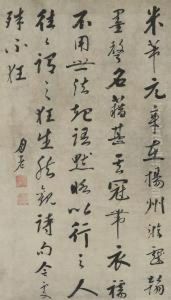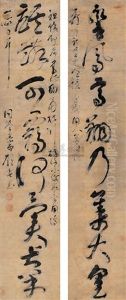Gu Yanwu Paintings
Gu Yanwu, also known as Gu Tinglin, was a Chinese philologist, geographer, and writer, but not primarily known as an artist in the traditional sense of visual arts. He was born on July 15, 1613, in Kunshan, Jiangsu during the Ming dynasty. Gu Yanwu's life was shaped by the tumultuous events of his time, as he lived through the end of the Ming dynasty and the establishment of the Qing dynasty. His scholarly work, however, has had a lasting impact on Chinese intellectual history, particularly in the fields of philology and geography.
Gu Yanwu's early life was marked by a rigorous education, and he demonstrated exceptional talent in classical studies. However, the collapse of the Ming dynasty in 1644 and the subsequent Manchu conquest profoundly affected him. He refused to serve the Qing dynasty and instead dedicated his life to scholarship and the preservation of traditional Chinese culture and learning. This decision to reject official service and focus on private study made him an important figure in the intellectual movement that later came to be known as the 'Evidential Research' (Kaozheng) school.
Throughout his life, Gu Yanwu traveled extensively across China, which greatly influenced his scholarly work. His experiences led him to criticize the overly speculative nature of Neo-Confucianism, advocating instead for an empirical approach to scholarship. He emphasized the importance of evidence and verification, urging scholars to study inscriptions, excavated texts, and geographical features to gain a better understanding of history and the classics.
One of Gu Yanwu's most significant contributions to Chinese scholarship is his work 'Rizhilu' ('Record of Daily Study'), which encompasses a wide range of subjects, including philology, etymology, geography, and history. It reflects his extensive travels and his dedication to the empirical study of the real world. Gu Yanwu's emphasis on practical knowledge and his critique of empty theorizing were influential in the development of Chinese intellectual thought.
Gu Yanwu passed away on February 15, 1682. His legacy persisted through his writings, which continued to influence Chinese scholarship for centuries. He is remembered not only for his contributions to philology and geography but also for his staunch commitment to intellectual independence and the pursuit of knowledge.

